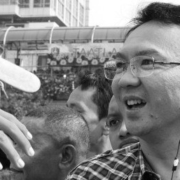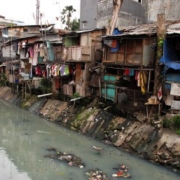
Volunteer group Teman Ahok collected copies of more than one million identity cards from Jakarta residents in support of Ahok’s run as an independent candidate. Photo by Rachman for Detik.
On 27 July, Jakarta Governor Basuki Tjahaja Purnama, better known as Ahok, announced that he would contest the 2017 gubernatorial election as a party-nominated candidate, backed by the Golkar Party, the People’s Conscience Party (Hanura) and the National Democrats (Nasdem). Following the announcement, he posed for photos with representatives of the three parties. So far, so normal. And yet, there was something unusual about the festive occasion.
Standing next to Ahok and the three party figures were three young sheepish-looking characters who smiled awkwardly at the cameras. The three figures were Amalia Ayuningtyas, Aditya Yogi Prabowo and Singgih Widyastono, founders of Teman Ahok (“Friends of Ahok”), a non-partisan support group of the incumbent governor that for months had been campaigning for Ahok to run as an independent in 2017. Ahok’s decision to accept a party nomination seemed to indicate that the group’s efforts had been in vain, but Teman Ahok is unlikely to disappear just yet.
Teman Ahok was established in early 2015 by five young activists who had already been part of Joko Widodo (Jokowi) and Ahok’s successful gubernatorial campaign in 2012. It was initially created to put public pressure on Jakarta’s regional legislature (DPRD), which at the time was engaged in a bitter dispute with Ahok over budget issues. This initial motivation then morphed into an ambition to mobilise broader support for Ahok to run as an independent candidate in the next election, just in case no party was willing to nominate the outspoken incumbent. Critics, however, have alleged that the whole narrative of a potential independent candidature was actually just a public relations ploy, devised by clever political consultants to boost Ahok’s profile as a maverick politician.
Indeed, Teman Ahok does have close links to the Cyrus Network, the consultancy firm that was in charge of the 2012 Jokowi-Ahok campaign. Back in 2015, Cyrus founder Hasan Nasbi not only gave funding to the fledgling activist group, but also provided mentoring and physical infrastructure in the form of an office for Teman Ahok. But to what extent Ahok was involved in the early stages of setting up Teman Ahok, if at all, remains unclear. Both Ahok and Teman Ahok have repeatedly insisted that the group was not collaborating with Ahok, whereas his critics have claimed that, basically, Teman Ahok is Ahok.
Irrespective of what role Ahok and Hasan played in the beginning, Teman Ahok quickly developed its own brand. Its main mission became the collection of identity cards (KTP) and signed forms of support for Ahok – the main legal requirement for an independent candidature in local executive elections is evidence that 7.5 percent of registered voters support the bid. Exploiting widespread anti-party sentiment in Jakarta, the group quickly reached the minimum requirement of 532,213 forms and in March 2016, Ahok declared that he would accept Teman Ahok’s support and run as an independent – a statement he reneged on just four months later.
Despite public support for Teman Ahok throughout the first half of 2016, the group’s activities ruffled more than a few feathers among the Jakarta elite. As time progressed, Teman Ahok became an increasingly troublesome irritant because it threatened to disrupt traditional nomination procedures. Candidates for executive office are usually expected to pay a hefty fee to parties in return for the privilege of being nominated. By mid-2016, when the possibility of Ahok running as a “Teman Ahok candidate” seemed real, the incumbent had greatly enhanced his bargaining powers vis-à-vis the parties.
The repercussions came thick and fast. Not only was one of Ahok’s closest advisors implicated in a corruption scandal over a controversial land reclamation project in North Jakarta, but Teman Ahok also faced questioning about its operations. Allegations of illicit funding from ethnic Chinese conglomerates surfaced, while alleged former members of the group claimed that the collection of KTPs had been marred by fraud and other irregularities. When two founding members of Teman Ahok were interrogated in Singapore over suspicions of illegal political activism in the Lion City, the emotional response by Teman Ahok members elicited much public ridicule and forced the group to issue an apology. Somewhat surprisingly, however, neither Teman Ahok nor Ahok himself were noticeably troubled by these episodes. On the contrary, Ahok’s electability remained high, and Teman Ahok continued to collect KTPs, reaching its one million benchmark on 19 June.
Given the political capital Ahok amassed through the activities of his “friends”, it may appear odd that he would risk squandering the momentum by accepting a party nomination. But as indicated, it may well be that he never really contemplated an independent run in the first place. In any case, the governor’s announcement means that Teman Ahok is unlikely to become the key protagonist of the 2017 campaign. Instead, the group will probably only end up a junior partner of the political parties. Nonetheless, its services will be desperately needed, as previous elections in Jakarta have shown that established parties have only limited capacity to mobilise voters.
It is therefore useful to see the creation and presence of Teman Ahok in the broader context of recent developments in electoral campaigning and non-partisan activism in Indonesia. Since the 2012 campaign for a “New Jakarta”, new forms of political activism have redefined the nature of electoral campaigning, as well as the relationship between political parties and non-partisan activists in elections. These new trends were particularly evident in the 2012 gubernatorial election in Jakarta and the 2014 presidential election.
In 2014, for example, Jokowi outsourced important campaign tasks from party networks and clientelistic success teams to so-called volunteers (relawan). The volunteers added previously unseen forms of collective action to the traditional campaign repertoire of Indonesian elections. While parties became increasingly sidelined during these campaigns, volunteer activism morphed into broad electoral movements that blended elements of social movements “from below” with features of political movements strategically created “from above”. These movements not only shaped the campaigns through their creativity and enthusiasm but also emerged as important new avenues for fundraising.
In some ways, the 2017 Jakarta election could take these developments to a new level, for example by formalising the collaboration between political parties and non-partisan activists in a joint campaign team. The fact that Ahok announced his party candidature at the headquarters of Teman Ahok rather than City Hall or a posh hotel indicates that such collaboration may indeed be possible.
But while this kind of campaign may result in unprecedented forms of cooperation between parties and activists, it is uncertain whether it will generate the level of public enthusiasm and mass mobilisation needed to spawn another broad-based electoral movement. Before the 27 July announcement, Teman Ahok seemed predestined to spearhead such a movement but now that it has lost its official raison d’etre, it faces two difficult challenges.
First, it will need to convince those who gave their KTPs to Teman Ahok – especially those who quickly spread the hashtag #BalikinKTPGue (Give me back my KTP) on Twitter after Ahok’s about-face – that the incumbent governor is still worthy of their support. Second, it will need to demonstrate that it can devise new mobilisation strategies that go beyond collecting signatures.
Only if Teman Ahok succeeds in overcoming these challenges will it be able to create Indonesia’s next big electoral movement.










